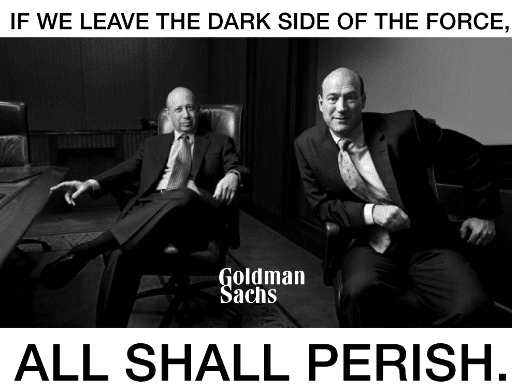
Goldman Sachs Scandal: Unmasking the Big Bad Wolf
Updated Oct 30, 2023
The Unveiling of the Scandal
While Goldman Sachs cultivated an image of prestige and sophistication on the global stage, storm clouds were gathering behind the scenes. In 2009, rumours began to swirl of suspicious payments and shadowy dealings within the highest echelons of the firm. At first, these whispers were easy to dismiss – after all, who would believe that one of the most respected names on Wall Street could be engaged in such evil behaviour?
However, the whispers soon grew louder as damning evidence and insider accounts surfaced. It emerged that certain executives at Goldman had been orchestrating a far-reaching scheme to curry favour with foreign officials through exorbitant bribes. Over $1.6 billion had allegedly changed hands as these executives greased the wheels to secure lucrative bond deals and other opportunities.
As the scope of the potential wrongdoing became clear, it sent shockwaves through the financial world. Goldman Sachs and its polished image of integrity were facing an existential crisis. Years of cultivating trust and prestige were now hanging in the balance. The scandal threatened to upend the firm’s reputation and called into question the ethics of the entire industry. What had been rumblings was now an all-out scandal that Goldman could no longer ignore or dismiss. The truth would not stay hidden in the shadows for long.
The Players and the Game
At the centre of the scandal were two Goldman Sachs executives – Tim Leissner and Roger Ng. Leissner served as the Chairman of Southeast Asia and was a powerful managing director. Ng held the dual roles of Managing Director and Head of Investment Banking for Goldman Sachs Malaysia.
These men hatched a scheme to use their influence and connections to funnel lucrative business to Goldman. Chief among their targets was 1Malaysia Development Berhad (1MDB), Malaysia’s strategic investment fund. By claiming to advise 1MDB, Goldman secured roles underwriting three bond deals totalling $6.5 billion.
However, their motives were far from altruistic. Behind the scenes, Leissner and Ng were actively engaged in bribery. Over $1.6 billion was allegedly paid out to officials in Malaysia and Abu Dhabi in exchange for helping Goldman obtain deals. 1MDB provided the perfect cover, with its mandate to promote Malaysian economic development.
The executives pursued these deals with single-minded intensity, focused only on the massive fees and bonuses that Goldman would reap. Their actions ultimately ensnared the firm in one of the largest financial corruption scandals in history.
The High Stakes of Corruption
The rewards for Leissner, Ng, and Goldman were indeed enticing – hundreds of millions in fees from the multi-billion dollar bond deals. However, the true cost was incalculable. The funds raised through 1MDB were intended to fuel ambitious economic initiatives and improve livelihoods across Malaysia.
Yet according to prosecutors, over $1 billion was siphoned off for bribery payments instead of development. Public and private institutions in both Malaysia and Abu Dhabi were corrupted as officials lined their pockets. Meanwhile, Goldman raked in ever-larger fees by cultivating these relationships of influence.
It was a betrayal that violated the core principles of fiduciary duty and good governance. More than that, it represented an abuse of power that directly undermined the well-being of entire nations. When a prominent bank like Goldman is willing to leverage its prestige for graft, it shakes the very foundations of finance.
This was not just an ethical lapse but a criminal violation of the Foreign Corrupt Practices Act. In the pursuit of profit, Leissner, Ng and their accomplices had shattered trust on a massive scale. Their actions would not only cost Goldman dearly but deal a blow to the integrity of global markets.
The Dominoes Begin to Fall
The fallout from the Goldman Sachs scandal sent shockwaves throughout the financial industry. Regulators began scrutinizing other major banks and financial institutions for potential violations of anti-bribery laws. Several banks came under investigation for their dealings with sovereign wealth funds in the Middle East and Asia. There was a growing sense that unethical and illegal practices were pervasive in global finance.
Activist groups seized on the scandal to demand meaningful reform. They called for tougher regulations, more transparency, and stronger enforcement. Politicians responded with a flurry of proposals to rein in Wall Street. Public trust in big banks declined sharply. Questions were raised about the ethics and culture of the entire industry.
The scandal also energized prosecutors. They began ramping up investigations into financial crimes. Record penalties were imposed on banks and executives found guilty of fraud and corruption, including a $2.9 billion fine for Goldman Sachs. Some prominent CEOs were forced to resign in disgrace. A new era of accountability in global finance seemed to be dawning. The Goldman case was just the beginning of the dominoes falling.
The Price of Greed
The financial penalty was just the tip of the iceberg. The true costs went much deeper. The scandal tarnished Goldman’s reputation as a premier global bank. Once seen as the gold standard in finance, it was now associated with shady backroom deals and corrupt practices. Investors and clients began to question whether they could trust Goldman to put ethics over profits.
The case also cast doubt on the integrity of Malaysia’s sovereign wealth fund, 1MDB. Billions of public dollars had been siphoned off instead of being used for development. The people of Malaysia were robbed of crucial resources. Faith in public institutions was badly shaken.
More broadly, the scandal highlighted flaws in the global financial system. Lax regulations and weak enforcement had allowed corruption to spread unchecked. The cozy relationships between bankers and politicians raised alarms. It became clear that reforms were badly needed to make finance more transparent and accountable.
Years later, Goldman Sachs is still struggling to restore its reputation fully. Malaysia is working to recover the stolen funds and rebuild trust in its institutions. The high costs extracted by the scandal continue to resonate. It serves as a lesson that the price of greed is often far steeper than it appears.
The Aftermath and the Future
The aftermath of the scandal continues to this day. Regulators remain vigilant in their pursuit of accountability across the financial industry. Anti-bribery and anti-corruption laws have been strengthened in many jurisdictions. Compliance standards have been raised significantly, with banks dedicating more resources to rooting out illicit behaviour.
For Goldman Sachs, the costs have been immense – both financially and to its brand. The bank has invested heavily in overhauling its culture and internal controls. A zero-tolerance policy is now in place for violations of ethics or law. Goldman also faces ongoing litigation from shareholders who argue the scandal damaged the value of their investments.
Perhaps the deepest impact is on public attitudes. Trust in the financial sector remains fragile after the crisis of confidence. Investors are more sceptical of promises of profit and are demanding greater transparency from corporations. Politicians now face pressure to be even tougher on Wall Street. The saga has highlighted the need for vigilance against greed, conflicts of interest, and lack of oversight in global finance. It serves as a lesson that will influence policy and practice for years.
Goldman’s Dark Legacy: Exploiting the Vulnerable in Pursuit of Profit
While Goldman Sachs weathered accusations of impropriety in the early 2000s, this was just the beginning of a dark legacy still coming to light. Beneath its relentless pursuit of profit, the cracks in Goldman’s foundation started to show – its veneer of success began peeling back to reveal the exploitation of the vulnerable as the actual engine powering its machine.
Through the late 2000s, Goldman pioneered the predatory practice of securitizing subprime mortgages while secretly betting on their failure. They roped in struggling homeowners with deceitful sales tactics and exploitative loans destined to default. All the while, Goldman was shorting the same assets it was selling, earning multi-billions as the housing market collapsed and the financial crisis hit. Countless lives were ruined, a recession ravaged the global economy – yet Goldman cashed in.
Even now, the full scope of damage from Goldman’s schemes during this unethical era still comes to light. Time and again, they chose profits over people, relying on deception and cunning financial engineering rather than ethical business practices. While the fines and lawsuits have cost Goldman dearly, its reputational wounds and broken trusts may never fully heal. This sordid chapter in Wall Street history shows the actual cost of putting profit above all else and serves as a warning for the future of conscious capitalism.
2002: A Slap on the Wrist for E-mail Oversight
While the $1.65 million fine in 2002 seemed nominal, it hinted at the deeper issues brewing within Goldman’s culture. The regulatory slap on the wrist for neglecting to preserve important emails raised questions about transparency and oversight and whether profit motives were obscuring proper diligence.
Yet rather than taking the opportunity to self-reflect and shore up weaknesses, Goldman largely dismissed the fine and pressed forward unchanged. Internally, they conveyed the message that success meant continuing business as usual, with little incentive to curb the aggressive, ends-justify-means mindset that tolerated compliance lapses in favour of closed-door dealmaking.
This was an early missed chance to course correct. As the housing crisis and financial meltdown later revealed, Goldman’s underlying issues had grown like metastasizing cancer, manifested through increasingly brazen conflicts of interest and exploitation of clients down the line. What began as a minor sanction over paperwork violations foreshadowed the lack of meaningful accountability that would enable Goldman’s worst impulses. Where there should have been a reckoning, there was merely a pass. The 2002 email ruling and its aftermath signalled the beginning of the end of Goldman’s claim to an honourable legacy.
2003: A Share in a Global Settlement
While the $110 million settlement in 2003 may have nominally addressed concerns, it failed to remedy the deep-rooted issues fueling Goldman’s prioritization of profits over its clients. The fine, just a drop in the bucket for a firm of Goldman’s size and wealth, was more an inconvenience than an impetus for real change. It left the perverse incentives that undermined research integrity untouched, allowing misleading presentations and hidden conflicts to continue poisoning the well.
Goldman gave no outward signs of using this opportunity for solemn self-examination. Rather than strengthen research safeguards, bolster faith in its impartiality, and make amends for damage done, it simply cut the check and went back to business as usual. The lack of meaningful reforms spoke volumes. Goldman conveyed it viewed such fines not as a call for reform but as the cost of doing business undeterred.
This missed chance to earn back trust through transparency and ethics reform would haunt Goldman in the following years. As the true scale of its misdeeds continued to be hidden from view, each temporary setback only delayed a reckoning that would grow far larger and more damaging when its missteps could no longer be swept under the rug. A lack of accountability was allowing grave issues to fester unchecked.
2004: The High-Yield Bond Challenge
While the $5 million fine in 2004 was Goldman’s largest to date, it still amounted to a trivial fraction of profits for misconduct that eroded investor trust. Once more, Goldman failed to see the penalty as a call to better policing of its trading desk behaviours and reform business practices that prioritized fleecing clients.
Rather than take the high-yield bond ruling as an opportunity for reflection and ensure its trading complied with both the letter and spirit of ethics rules, Goldman mostly dismissed the fine as an inevitable cost of maintaining its risk-taking, results-above-all trading culture. It conveyed to employees that rule-breaking was acceptable as profits kept swelling, with compliance more of an annoying box-checking exercise than a moral obligation.
Had Goldman used this latest penalty to institute rigorous supervision and make a reasonable faith effort to adhere to fair dealing, it may have avoided future, far costlier violations. But at every misstep that should have prompted the change, profits blinded it from recognizing the enabling of destructive behaviours would only lead to an ethical downward spiral with devastating long-term effects.
2005: Paying the Price for Stock Allocation
The fines in 2005, totalling over $40 million, were eye-popping sums that should have given Goldman pause. Their misconduct around IPO stock allocation and sales of restricted securities revealed how deeply issues of corruption and improper dealing had already taken root. Nonetheless, Goldman remained defiantly unwilling to address the value distortion at the core of such transgressions.
Rather than use these penalties to implement fundamental safeguards against influence-peddling and pay-to-play dynamics, Goldman doubled down on a “deny and defy” strategy. They refused to acknowledge the pernicious cultural factors allowing unethical behaviours to thrive, such as prioritizing revenue generation from well-heeled clients above all else.
By continuing to dismiss these sanctions as politically motivated “witch hunts” rather than accountability for harming investors and warping market integrity, Goldman sent a clear message that compliance was an afterthought, not a guiding principle. Their unrepentant stance, refusing regulation while also refusing to regulate itself, ensured ethical issues would only fester more dangerously unchecked. The stage was set for an imminent, explosive crisis.
2006: Overcoming Auction-Rate Setbacks
Yet, while Goldman’s saga seems like one of perseverance through hardship, the whole truth is darker. Beneath its veneer of success, each fine concealed festering rot—rules were treated as inconveniences, victims as costs of doing business. Where accountability was due, there was only arrogance. Each punishment met with defiance ensured problems continued unchecked, poisoning Goldman’s reputation and society.
The financial crisis of 2008 exposed that Goldman’s most incredible adversity was self-inflicted due to a toxic “profits uber alles” culture left to metastasize for years. As the scheme to profiteer from the housing collapse came to light, Goldman was revealed not as a triumpher of challenges but an orchestrator of societal ruin, placing shareholders before customers, clients, and citizens.
Goldman’s rise was no victory for rugged perseverance but one built on a legacy of abuse of power and influence for private gain. Though it survived the wreckage, its story stands as a dire warning—that where corruption and lack of ethics go unchecked, a tragedy for many will follow profit for the few. Some adversities are not meant to be overcome but remedied. Full Story
Conclusion: The Goldman Sachs scandal
While the consequences dealt to Goldman Sachs demonstrated some semblance of accountability, one cannot help but wonder – have the proper lessons been learned? The ongoing effects of the firm’s actions, from lost homes and livelihoods to lasting economic wounds, far surpass any penalties paid. And some of the perverse incentives and culture of corruption that allowed such widespread harm remain inadequately addressed.
Merely surviving a scandal is not a victory if the roots of failure are left unexamined and unreformed. As Goldman and its peers continue operations, the test remains whether they have internalized that success requires more than avoiding legal culpability – prioritizing citizens over quarterly earnings, earning trust through transparency instead of influence, and reforming systems-level issues over individual wrongdoings.
Goldman’s dark legacy underscored how far interests can stray without principled guardrails. If its story is to prevent continued crises ultimately, the financial industry must prove through deeds, not words, that it understands its purpose is broader than profits alone. Justice and recovery are not ends but the beginning of rebuilding an ethical foundation. The lessons of 2008 and Goldman Sachs’ role can only be learned through genuine, self-initiated change.
Other Articles of Interest:
Student Debt Crisis Overblown & Due to Stupidity
False Information, Mass Psychology & this Hated Stock Market Bull
Long-Term, Stock Market Bears, Always Lose
Information overkill & trading markets utilising Mass Psychology










